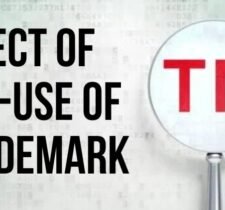The prior use of the trademark ceases the registration of the identical trademark

The prior use of the trademark curtails the rights of the registration of the identical trademark though the registration of the identical trademark confers powers upon the registered owner to use the mark exclusively in accordance with the conditions stated in the Register Book and get the remedy for infringement of the trademark (section 25 of the Trademark Act, 2000 (hereinafter referred to TM Act, 2009).
Section 30 of the TM Act, 2009 explains the provision of the prior use of the trademark and provides the vested rights of the prior user of the trademark and states that the proprietor of a registered trademark or well-known mark or a registered user shall not interfere with or restrain any person or his predecessor from using a trademark identical with or nearly resembling it in relation to goods or services if it has continuously been used by them from a date prior to the use of the registered trademark or well-known mark in relation to those goods or services by the proprietor or a predecessor-in-title of his.
The prior use of the trademark shall not be refused to be registered due to having of the registered trademark or well-known mark.
Article 16 (1) of the Trade-Related Aspects of Intellectual Property Rights (TRIPS) provides that the rights conferred by the registration of the trademark shall not prejudice any existing prior rights, nor shall they affect the possibility of making rights available on the basis of use. In the case of BBC Vs. Registrar, DPDTM & ors reported in 4 SCOB [2015] HCD 89, 5 CLR (2017) HCD 101, it was held that section 30 of the TM Act, 2009 provides that priority of use of the mark gets paramount consideration compared to registration.
The right created in favour of a registered proprietor of a trademark is not an absolute right and is subservient to other provisions of the TM Act, 2009. In other words, registration of a trademark does not provide a defense to the proceedings for passing off as under section 24 of the Act, 2009. The prior user of the trademark can maintain an action for passing off against any subsequent user of an identical trademark, including a registered user thereof.
Though a suit cannot be instituted to get the remedy of infringement of an unregistered trademark or recovery of compensation for an unregistered trademark (section 24(1) of the TM Act, 2009), the prior user of the trademark can protect the unregistered trademark in the form of passing off under section 24 (2) of the TM Act, 2009. The doctrine of passing off emanates from the common law principles.
It connotes the sale of goods or services by the person misrepresenting his goods or services as the goods or services of another. The passing off tort aims to protect the goodwill of a business entity. Section 24(2) of the TM Act, 2009 allows taking action against the passing off goods or services of another person. Lord Langdale defines passing off in Perry v. Truefitt as quoted “A man may not sell his own goods under the pretence that they are the goods of another man.” In this case, it was also held that the goodwill of the product is to be protected.
In the Spalding case (A.G. Spalding & Bros. v. A.W. Gamage Ltd. (1915), 32 R.P.C. 273 at 283 (H.L.), five characteristics were identified to be a legitimate cause of action for passing off: (1) a misrepresentation; (2) made in the course of trade; (3) to prospective customers of his or ultimate consumers of goods or services supplied by him; (4) which is calculated to injure the business or goodwill of another trader; and (5) which causes actual damage to a business or goodwill of the trader by whom the action is brought or (in a quia timet action) will probably do so.
Further, the test of passing off was reiterated in the Reckitt & Colman Products case (Reckitt & Colman Products Limited v. Borden Inc. & Ors, [1990] R.P.C. 341 (H.L.) and it was held that the plaintiff must prove the three elements: (1) that the plaintiff has the requisite degree of goodwill or reputation in the mind of the purchasing public; (2) that the defendant has made a misrepresentation to the public; and (3) that the plaintiff, as a result of the misrepresentation, has suffered, or is likely to suffer, damage.




